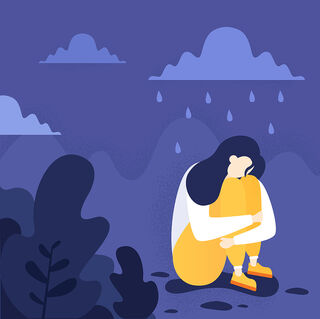Grief
Three Lessons on Loss and Grief
There is no incorrect way to respond to loss.
Posted August 3, 2020 Reviewed by Gary Drevitch

For days, weeks, or even months after losing someone, you may wake up in the morning with an overwhelming sadness. It can feel like a heaviness pushing down on your chest, and it starts before your conscious mind has even kicked in to remind you of what you have lost. It wasn’t just a bad dream.
Deaths of family, friends, and partners can be so devastating that your whole orientation in life feels lost, and the way your brain and body initially react to the trauma may confuse you. But there is no incorrect way to respond to loss. Don’t judge yourself.
To help you grieve and heal after a loss, here are three things you should know.
1. Grief is a healthy and necessary process.
The first thing you need to understand about grief is that you can’t take it away, and you shouldn’t try. Love lost is painful. It just is. Grief is an essential part of realistic positivity—the mindset in which we accept what is and strive for what is possible—as acceptance and acknowledgment of “what is.” Trying to avoid grieving will not work and will only increase and prolong your suffering. Unless you process grief when the loss occurs, your emotions will become stuck in your system—both mind and body. Grief will stay with you as energy in your unconscious, affecting your life until discovering it and processing it out.
Allowing your feelings to wash over you and sitting with them for a while in this accepting and non-judgmental manner is a profound healing method. Though you might imagine the worst when considering what will happen if you allow yourself to feel your feelings—that they will last forever and might even cause you to go right off the deep end— this isn’t the case. Eventually, the feelings will subside, and you will move forward in the grieving process.
2. You build resiliency by honoring and replacing what you’ve lost.
Often when a loved one dies, you lose several things at once: the person, your relationship with them, your way of living if they were your helpmate, your plans with them, and so on. Replacing what you lost in a situation of this magnitude won’t happen right away and won’t be easy, but it’s necessary—because your own life is still worth being the best it can be, despite someone you love no longer being with you.
Replacing your loss doesn’t mean forgetting the person who has died; it means finding a new person or persons to fill the role of friend, lover, or mentor. It requires allowing yourself to grieve the death fully and to let go of expectations of filling the lost person’s shoes in the same way. Replacing loss requires an awareness of your needs and the willingness to reach out toward others to fulfill them. It requires self-compassion and patience as you find your new way forward.
Perhaps no event is more likely to trigger isolation than the trauma of losing a loved one, but you need to reach out to recover. Of course, if you’re reading this amid the COVID-19 pandemic, you know how logistically difficult this can be. Getting out of yourself and focusing on someone else’s needs instead of your own is a time-tested way to heal—volunteer to tutor students online or adopt a dog or cat that needs care and a loving home. And use Zoom or socially-distanced visits to stay connected with the friends and family who are grieving also. You can help each other heal.
3. Through loss, you learn to value life.
Death teaches us that every moment counts, that we must live and love fully, knowing that we may not get another chance. This knowledge can help you make better choices and affect how you experience life. The loss of a loved one creates an opportunity to deepen existing connections or create new ones. It can push you to meet new people and explore new ways to achieve the affirmation and love that you need.
Many people say that they became more thoughtful, loving, and compassionate after losing someone they love. It’s often the fire of this type of experience that burns away what is false and not serving you, and in rising from the ashes, you can become your most authentic, best self.
Through your memories and your love and your life, the person you lost is never truly gone. They are still with you because of who you became by being with them; they truly are part of you and live on through you. You honor their memory by living your best possible life.
Facebook/LinkedIn image: fizkes/Shutterstock


